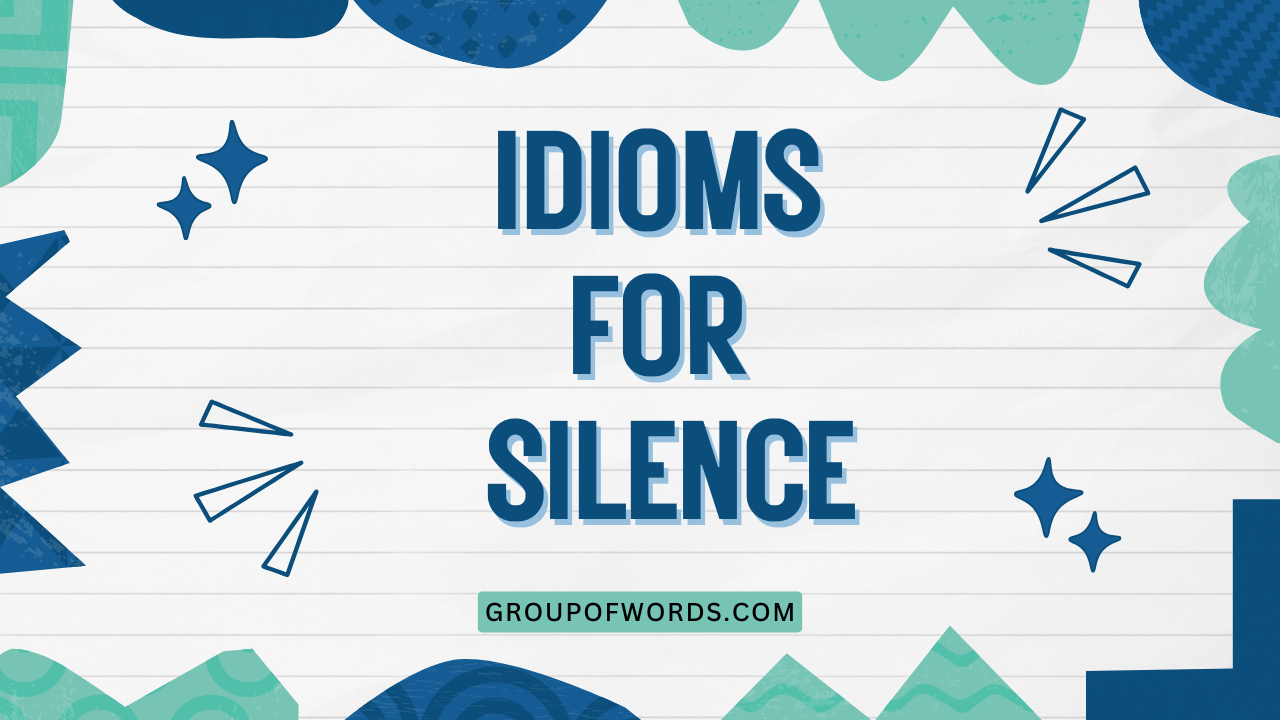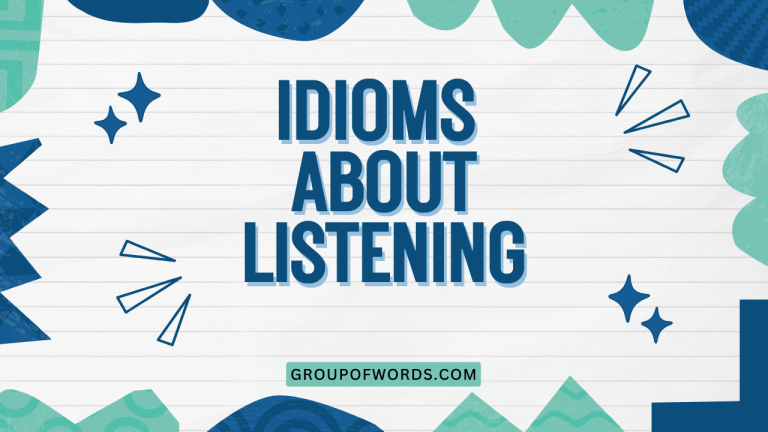Idioms for Silence: A Comprehensive Guide
Silence, often more powerful than words, is a concept deeply embedded in human communication. English, with its rich tapestry of expressions, offers a plethora of idioms to convey various aspects of silence, from choosing to remain quiet to being forced into it.
Understanding these idioms not only enhances your vocabulary but also provides a deeper insight into the nuances of English conversation. This article is designed for English language learners of all levels who wish to enrich their linguistic toolkit and gain a more sophisticated understanding of how silence is expressed in English.
Whether you’re a beginner or an advanced speaker, this guide will equip you with the knowledge and practice needed to master idioms for silence.
Table of Contents
- Introduction
- Definition of Idioms for Silence
- Structural Breakdown of Idioms
- Types and Categories of Idioms for Silence
- Examples of Idioms for Silence
- Usage Rules
- Common Mistakes
- Practice Exercises
- Advanced Topics
- FAQ
- Conclusion
Definition of Idioms for Silence
Idioms for silence are figurative expressions that use silence, or the act of being quiet, as a central theme. These idioms go beyond the literal meaning of “not speaking” and often convey deeper meanings related to choice, obligation, discomfort, or secrecy.
An idiom, in general, is a phrase or expression whose meaning cannot be understood from the ordinary meanings of its individual words. Instead, the phrase has a figurative meaning known only through common use.
In the context of silence, idioms provide a colorful and nuanced way to express complex situations and emotions related to the absence of speech.
Classifying idioms for silence involves understanding the context in which they are used. Some idioms describe a voluntary choice to remain silent, while others describe situations where silence is imposed or arises due to social awkwardness.
Understanding the classification helps in using the appropriate idiom in different scenarios. The function of these idioms extends beyond mere description; they add emotional depth, cultural context, and often a layer of humor or irony to communication.
The contexts in which idioms for silence are used are varied, ranging from formal settings like legal proceedings to informal conversations with friends and family. The choice of idiom often depends on the specific situation and the desired effect.
Structural Breakdown of Idioms
The structural elements of idioms for silence vary greatly, as they encompass a wide range of grammatical forms. Some idioms are phrases, others are clauses, and some even take the form of complete sentences.
The key to understanding the structure lies in recognizing that the idiom’s meaning is not derived from the literal interpretation of its components. Instead, the entire phrase functions as a single semantic unit.
For example, the idiom “mum’s the word” is a complete sentence, but its meaning is not about a mother saying a word; it means “keep this a secret.”
The patterns in idioms for silence often involve metaphors, similes, or personification. Metaphors compare silence to something else, such as “a pregnant pause,” where silence is likened to a pregnant woman, full of potential.
Similes use “like” or “as” to make a comparison, though they are less common in idioms for silence. Personification gives human qualities to silence, such as “silence roared,” where silence is given the ability to make a loud noise, emphasizing its overwhelming presence.
Recognizing these patterns can help learners identify and understand new idioms more easily. The rules governing the structure of idioms are flexible since idioms are established through usage rather than grammatical rules.
However, the word order is generally fixed, and changing it can alter or destroy the meaning of the idiom. For instance, “hold your tongue” cannot be rearranged as “tongue your hold” without losing its idiomatic sense.
Types and Categories of Idioms for Silence
Idioms for silence can be categorized based on the different reasons or contexts in which silence is employed. These categories help to understand the nuances of silence and how it is expressed in the English language.
Choosing to be Silent
This category includes idioms that describe situations where someone consciously decides to remain silent. This choice might be due to wisdom, discretion, or a strategic reason.
These idioms often highlight the power and control that comes with choosing silence.
Imposed Silence
These idioms refer to situations where silence is not a choice but is forced upon someone. This could be due to authority, fear, or a lack of opportunity to speak.
These idioms often convey a sense of oppression or helplessness.
Awkward Silence
This category describes the uncomfortable silence that arises in social situations, often due to a lull in conversation or a sensitive topic. These idioms usually emphasize the discomfort and social tension associated with such silences.
Silence as a Secret
These idioms relate to keeping secrets and the silence that is necessary to maintain confidentiality. They often convey the importance of discretion and the potential consequences of breaking the silence.
Examples of Idioms for Silence
To fully understand the use of idioms for silence, it’s essential to examine them in context. The following tables provide examples of idioms categorized by their type, along with explanations and example sentences.
Choosing to be Silent Examples
This table presents idioms that describe situations where someone decides to remain silent, often for strategic or personal reasons. They reflect a conscious choice to withhold speech.
| Idiom | Meaning | Example Sentence |
|---|---|---|
| Hold your tongue | To remain silent; to not speak when you want to | I wanted to argue, but I decided to hold my tongue and avoid a fight. |
| Bite your tongue | To stop yourself from saying something you really want to say | She had to bite her tongue to keep from criticizing his awful cooking. |
| Mum’s the word | Keep this a secret; say nothing about this | Mum’s the word about the surprise party – don’t tell anyone! |
| Keep schtum | To remain silent; keep a secret (British slang) | The boss told us to keep schtum about the company’s financial problems. |
| Button your lip | Be quiet; stop talking | Just button your lip and let me handle this situation. |
| Say nothing | To remain completely silent | He chose to say nothing, hoping the problem would resolve itself. |
| Stay silent | To deliberately not speak | She decided to stay silent during the meeting to observe the dynamics. |
| Not breathe a word | To not tell anyone a secret | I’m trusting you to not breathe a word of this to anyone. |
| Zip your lip | To be quiet; stop talking (similar to “button your lip”) | If you know what’s good for you, you’ll zip your lip right now. |
| Keep mum | To remain silent; keep a secret | We have to keep mum about the new project until it’s officially announced. |
| Not utter a peep | To not make any sound at all | The children were so well-behaved, they didn’t **utter a peep** during the ceremony. |
| Keep one’s own counsel | To keep one’s thoughts and opinions to oneself | In such a sensitive matter, it’s best to **keep one’s own counsel** until all the facts are clear. |
| Hold one’s peace | To remain silent, especially during a formal occasion | The bride’s ex had to **hold his peace** during the wedding ceremony, despite his objections. |
| Let sleeping dogs lie | To avoid stirring up trouble by remaining silent | I wanted to bring up the issue, but I decided to **let sleeping dogs lie** to avoid a conflict. |
| Sit on it | To suppress or keep quiet about something (often used informally) | I have some exciting news, but I need to **sit on it** until the official announcement. |
| Keep it under one’s hat | To keep something secret | Can you **keep it under your hat**? I’m planning a surprise party for John. |
| clam up | To suddenly become silent and refuse to talk | When the police started asking questions, he **clammed up** and refused to say anything. |
| Say no more | To indicate that one understands and no further explanation is needed | “He’s been having some personal issues lately.” “Say no more, I understand why he’s been distant.” |
| Draw a veil over | To deliberately avoid mentioning something unpleasant or embarrassing | Let’s **draw a veil over** that unfortunate incident and move on. |
| Not let on | To not reveal a secret or show one’s true feelings | She knew the answer, but she didn’t **let on** because she wanted to see if others knew it too. |
| Keep a lid on | To keep something secret or prevent it from becoming public knowledge | The company tried to **keep a lid on** the scandal to protect its reputation. |
| Stay mum | To remain silent; keep a secret (variation of “keep mum”) | The lawyers advised him to **stay mum** during the investigation. |
| Keep one’s mouth shut | To remain silent; avoid speaking about something | If you want to stay out of trouble, you’d better **keep your mouth shut**. |
| Hold back | To restrain oneself from saying something | She had to **hold back** from telling him the truth, as it would have hurt him deeply. |
Imposed Silence Examples
The following table showcases idioms that describe situations where silence is forced upon someone, often by authority, fear, or circumstance. These idioms often carry a sense of restriction or lack of agency.
| Idiom | Meaning | Example Sentence |
|---|---|---|
| Shut someone up | To force someone to be quiet | The dictator used propaganda to shut up any dissenting voices. |
| Silence someone | To make someone unable to speak or express their opinion | The government tried to silence the journalists by censoring their articles. |
| Muzzle someone | To prevent someone from expressing their opinions freely | The new law was seen as an attempt to muzzle the press. |
| Gag someone | To prevent someone from speaking, literally or figuratively | The kidnappers gagged their victim to prevent them from calling for help. |
| Have your tongue tied | To be unable to speak, often due to shyness or nervousness | He had his tongue tied in front of the beautiful actress. |
| Struck dumb | To be so surprised or shocked that you cannot speak | She was struck dumb by the news of her promotion. |
| Reduced to silence | To be forced into silence, often by authority or fear | The students were reduced to silence by the principal’s stern warning. |
| Deafening silence | An overwhelming silence, often indicating disapproval or shock | The proposal was met with a deafening silence, indicating its unpopularity. |
| Quiet as a mouse | Very quiet, often due to fear or caution | The children were quiet as a mouse, hoping not to wake their sleeping father. |
| Not allowed to speak | Forbidden to talk or express opinions | In that household, children were not allowed to speak unless spoken to. |
| Under a vow of silence | Having promised not to speak, often for religious or personal reasons | The monks were **under a vow of silence** and communicated through gestures. |
| Keep a tight rein on | To control someone or something strictly, often suppressing their freedom of expression | The manager **kept a tight rein on** his employees, not allowing them to voice their concerns. |
| Bring someone to heel | To force someone to obey or be submissive, often silencing their opposition | The dictator sought to **bring all dissenters to heel** through intimidation and censorship. |
| Put a lid on (something) | To suppress or prevent something from being discussed or revealed | The company tried to **put a lid on** the scandal to protect its reputation. |
| Squash dissent | To suppress opposition or disagreement forcibly | The government was accused of trying to **squash dissent** by arresting political activists. |
| Out of the loop | Not informed about something, often leading to imposed silence due to lack of knowledge | Since he was **out of the loop**, he couldn’t contribute to the discussion. |
| Left speechless | So surprised or shocked that one is unable to speak | The unexpected news **left her speechless**. |
| Lost for words | Unable to think of anything to say, often due to emotion or surprise | He was **lost for words** when he saw the extent of the damage. |
| Smother debate | To suppress or stifle discussion or argument | The chairman was criticized for trying to **smother debate** at the meeting. |
| Hold sway over | To have a strong influence or control over someone, often leading to their silence | The powerful CEO **held sway over** the entire company, and no one dared to challenge him. |
| Clamp down on | To take strict measures to suppress or prevent something, including speech | The authorities **clamped down on** protests, arresting anyone who spoke out against the government. |
| Silenced by fear | Unable to speak due to fear of repercussions | The witnesses were **silenced by fear** and refused to testify against the mob boss. |
| Under duress | Forced to remain silent or comply due to threats or coercion | He confessed to the crime, but later claimed he had been acting **under duress**. |
| Keep under wraps | To keep something secret or concealed, often preventing it from being discussed | The new product is being **kept under wraps** until the official launch date. |
Awkward Silence Examples
This table provides idioms that describe the uncomfortable silence that occurs in social situations, usually due to a lull in conversation, a sensitive topic, or social discomfort. These idioms highlight the tension and unease associated with such moments.
| Idiom | Meaning | Example Sentence |
|---|---|---|
| Pregnant pause | A long, meaningful silence, often filled with anticipation or tension | There was a pregnant pause after he asked the question, and everyone waited for her answer. |
| Silence hung in the air | A noticeable silence that creates a sense of tension or discomfort | After the argument, silence hung in the air, thick with unspoken words. |
| You could hear a pin drop | The silence is so complete that even a small sound would be noticeable | During the tense scene in the movie, you could hear a pin drop in the theater. |
| Heavy silence | A silence that is oppressive and uncomfortable | A heavy silence fell over the room after the bad news was announced. |
| Uncomfortable silence | A silence that makes people feel awkward and uneasy | An uncomfortable silence followed his inappropriate joke. |
| A lull in the conversation | A temporary pause in the conversation | There was a lull in the conversation, and no one seemed to know what to say. |
| Blank stare | A vacant, expressionless look that can create awkwardness | He gave me a blank stare when I mentioned the project, so I knew he hadn’t been informed. |
| Silence descends | A silence that gradually falls over a place or group of people | Silence descended upon the crowd as the speaker began to talk about the tragedy. |
| Empty silence | A silence that is devoid of any emotion or meaning | An empty silence stretched between them after their relationship ended. |
| A long pause | An extended period of silence | There was a long pause before she finally answered the question. |
| Silence filled the room | A noticeable silence that occupies the entire space | **Silence filled the room** as everyone waited for the verdict. |
| Die away | To gradually fade or diminish, often referring to sound, but can also describe the end of a conversation | The music began to **die away**, leaving the couple in a moment of quiet contemplation. |
| Fall flat | To fail to produce the intended effect, especially a joke or remark, leading to awkward silence | His attempt at humor **fell flat**, resulting in an awkward silence. |
| Stony silence | A cold, unfriendly silence | She was met with **stony silence** when she tried to apologize for her mistake. |
| Hang fire | To delay taking action or making a decision, leading to a temporary silence | We decided to **hang fire** on the project until we had more information. |
| Drop off | To gradually decrease or fade (referring to the level of conversation) | The conversation began to **drop off** as people grew tired. |
| Quiet spell | A short period of silence | There was a **quiet spell** in the classroom while the students focused on their work. |
| Break the silence | To be the first to speak after a period of silence | She decided to **break the silence** and ask the question that was on everyone’s mind. |
| Momentary hush | A brief period of silence | A **momentary hush** fell over the crowd as the singer took the stage. |
| Stillness reigned | A complete absence of movement or sound, often creating an eerie or uncomfortable atmosphere | **Stillness reigned** in the abandoned house, broken only by the creaking of the floorboards. |
| The air was thick with silence | A silence that is heavy and filled with unspoken tension | **The air was thick with silence** after the heated argument. |
| A pin could be heard | The silence is so complete that even the smallest sound would be noticeable (similar to “you could hear a pin drop”) | The courtroom was so silent that **a pin could be heard** as the jury delivered the verdict. |
| Dead air | A period of silence on radio or television, often considered unprofessional or awkward | The radio host panicked when there was a few seconds of **dead air** during the broadcast. |
Silence as a Secret Examples
This table presents idioms related to keeping secrets and the silence necessary to maintain confidentiality. These idioms often convey the importance of discretion and the potential consequences of breaking the silence.
| Idiom | Meaning | Example Sentence |
|---|---|---|
| Take something to the grave | To keep a secret for your entire life | He promised to take the secret to the grave, never revealing it to anyone. |
| Seal your lips | To promise to keep a secret | I’m going to tell you something, but you have to seal your lips and never repeat it. |
| Keep a secret under wraps | To keep something secret | The company is trying to keep the new product under wraps until the official launch. |
| Close-mouthed | Reluctant to talk; secretive | He’s very close-mouthed about his personal life. |
| Silent treatment | Refusing to speak to someone as a form of punishment or disapproval | She gave him the silent treatment after their argument. |
| Lie low | To avoid attention or stay out of sight, often to keep a secret | After the scandal, he decided to lie low for a while. |
| Hush-hush | Secret; confidential | The project is very hush-hush, so don’t tell anyone about it. |
| Behind closed doors | In private; secretly | The negotiations took place behind closed doors. |
| Keep dark | To keep something secret | They tried to keep dark the details of the investigation. |
| Hold something back | To not reveal something; to keep a secret | She felt like he was holding something back from her. |
| Close to the vest | To keep something private or secret, not revealing intentions or information | He played his cards **close to the vest** during the negotiations, revealing very little. |
| Not breathe a word of it | To not tell anyone about something (variation of “not breathe a word”) | I told her about the surprise party, but warned her **not to breathe a word of it** to John. |
| In camera | In private, especially in a legal context | The judge decided to hear the testimony **in camera** to protect the witness. |
| A need-to-know basis | Information is only shared with those who require it | Access to the confidential documents was restricted to a **need-to-know basis**. |
| Under the rose | Secretly or confidentially | The deal was arranged **under the rose** to avoid attracting attention. |
| In strict confidence | With a firm assurance that the information will remain secret | I’m telling you this **in strict confidence**, so please don’t share it with anyone. |
| Mum on the subject | Remaining silent about a particular topic | The company remained **mum on the subject** of the merger. |
| Under a cloak of secrecy | Surrounded by or hidden by secrecy | The project was developed **under a cloak of secrecy**. |
| Swept under the carpet | Ignored or concealed, especially something embarrassing or damaging | The scandal was **swept under the carpet** to protect the company’s reputation. |
| Keep mum about something | To remain silent about something (variation of “keep mum”) | The family decided to **keep mum about** the inheritance. |
| Under one’s hat | To keep something secret (variation of “keep it under one’s hat”) | She kept the good news **under her hat** until she was ready to announce it publicly. |
| Hidden agenda | A secret or ulterior motive | He suspected that the politician had a **hidden agenda**. |
| Behind the scenes | Secretly or privately, without public knowledge | A lot of work was done **behind the scenes** to make the event a success. |
| Clammed up about something | Became silent and refused to talk about something (variation of “clam up”) | He **clammed up about** what happened at the party. |
Usage Rules
The usage rules for idioms are not as strict as those for grammatical structures, but there are still guidelines to follow to ensure correct and effective communication. The primary rule is to understand the context in which the idiom is appropriate.
Using an idiom in the wrong context can lead to confusion or misinterpretation. For example, using “mum’s the word” in a formal business meeting might be out of place, while it’s perfectly acceptable among friends.
Another crucial rule is to avoid overusing idioms. While they can add color and depth to your language, too many idioms can make your speech sound unnatural or forced.
It’s best to use them sparingly and only when they genuinely enhance the meaning of your message. Additionally, be aware of regional variations.
Some idioms are more common in certain dialects or countries than others. For instance, “keep schtum” is a British slang term that might not be widely understood in the United States.
Finally, be careful when translating idioms. Direct translations rarely work, as the meaning is often lost or distorted in the process.
It’s better to find an equivalent idiom in the target language or explain the concept in simpler terms.
Common Mistakes
One of the most common mistakes learners make with idioms is taking them literally. Since idioms have a figurative meaning, interpreting them word-for-word can lead to humorous or nonsensical statements.
For example, understanding “hold your tongue” as physically grabbing your tongue is incorrect. The correct interpretation is to refrain from speaking.
Another frequent error is misremembering the exact wording of an idiom. Idioms are fixed expressions, and changing the words can alter or destroy their meaning.
For instance, saying “hold your mouth” instead of “hold your tongue” doesn’t convey the intended meaning. Also, mixing up idioms with similar meanings is another common mistake.
For example, using “bite your lip” when you meant to say “bite your tongue” can slightly change the nuance of the expression. Here are some examples of correct and incorrect usage:
| Incorrect | Correct | Explanation |
|---|---|---|
| Hold your mouth. | Hold your tongue. | The correct idiom is “hold your tongue,” meaning to remain silent. |
| Mum is the word. | Mum’s the word. | The correct idiom is “mum’s the word,” a shortened form of “mother is the word,” meaning keep it secret. |
| Zip your mouth. | Zip your lip. | The correct idiom is “zip your lip,” meaning be quiet. |
| Bite your lip. (when meaning to stop yourself from saying something) | Bite your tongue. | While “bite your lip” exists, “bite your tongue” is the correct idiom for stopping yourself from speaking. |
| Keep shut. | Keep mum. | The correct idiom is “keep mum,” meaning remain silent or keep a secret. |
Practice Exercises
Test your understanding of idioms for silence with these exercises. Fill in the blanks with the appropriate idiom from the list provided.
Answers are below.
- I wanted to tell her what I thought, but I had to __________.
- __________ about the new project; it’s a secret!
- The boss told everyone to __________ about the company’s financial troubles.
- After the heated argument, __________ hung in the air.
- The children were __________ as mice, hoping not to wake their father.
- He promised to __________ and never reveal the truth.
- The government tried to __________ by censoring the news.
- There was a __________ after he asked the question, and everyone waited for her response.
- She gave him the __________ after he forgot their anniversary.
- The negotiations took place __________.
Idiom List:
- hold my tongue
- Mum’s the word
- keep schtum
- silence hung in the air
- quiet
- take the secret to the grave
- silence the journalists
- pregnant pause
- silent treatment
- behind closed doors
Answer Key:
- hold my tongue
- Mum’s the word
- keep schtum
- silence hung in the air
- quiet
- take the secret to the grave
- silence the journalists
- pregnant pause
- silent treatment
- behind closed doors
Exercise 2: Choose the correct idiom to complete each sentence.
- He was so shocked by the news that he was __________.
- A) struck dumb
- B) struck deaf
- C) struck blind
- We need to __________ on this issue until we have more information.
- A) sit on it
- B) stand on it
- C) lie on it
- The company is trying to __________ the scandal to protect its reputation.
- A) keep under wraps
- B) keep under covers
- C) keep under blankets
- The new law was seen as an attempt to __________ the press.
- A) muzzle
- B) nose
- C) mouth
- After the argument, she decided to __________ and ignore him.
- A) give the loud treatment
- B) give the silent treatment
- C) give the quiet treatment
- The boss told us to __________ about the upcoming layoffs.
- A) keep mum
- B) keep dad
- C) keep uncle
- The atmosphere was so tense that __________.
- A) you could hear a feather drop
- B) you could hear a pin drop
- C) you could hear a coin drop
- I’m telling you this __________, so please don’t share it with anyone.
- A) in strict confidence
- B) in tight confidence
- C) in close confidence
- The details of the project are __________.
- A) hush-hush
- B) hush-noisy
- C) hush-loud
- He was advised to __________ during the investigation.
- A) stay mum
- B) stay dad
- C) stay uncle
Answer Key:
- A
- A
- A
- A
- B
- A
- B
- A
- A
- A
Advanced Topics
For advanced learners, delving into the etymology and historical context of idioms for silence can provide a richer understanding. Many idioms have roots in historical events, literature, or cultural practices.
For example, “mum’s the word” is believed to originate from the
Middle Ages, where the word “mum” was used to indicate silence. Understanding these origins can make the idioms more memorable and provide additional insight into their usage.
Another advanced topic is exploring the subtle differences between idioms with similar meanings. For instance, while “hold your tongue” and “bite your tongue” both mean to refrain from speaking, “bite your tongue” often implies a stronger urge to speak and a more deliberate effort to remain silent.
Analyzing these nuances can help you choose the most appropriate idiom for a given situation.
Finally, consider the use of idioms in literature and media. Authors and screenwriters often use idioms to add depth and authenticity to their characters’ dialogue.
Identifying and analyzing these idioms can enhance your comprehension and appreciation of the work. Furthermore, understanding how idioms are used in different genres and styles can help you develop your own writing skills.
FAQ
- Q: Are idioms for silence used in formal writing?
- A: Generally, idioms are more common in spoken language and informal writing. However, some idioms may be appropriate in formal writing if they fit the tone and context. It’s essential to consider your audience and the overall style of your writing.
- Q: Can I create my own idioms for silence?
- A: While it’s possible to create new expressions, they only become idioms if they are widely adopted and understood by a significant number of people. Idioms are established through common usage over time.
- Q: How can I improve my understanding of idioms for silence?
- A: The best way to improve your understanding is through exposure and practice. Read widely, listen to native speakers, and pay attention to how idioms are used in different contexts. Also, make a habit of looking up unfamiliar idioms and practicing their usage in your own speech and writing.
- Q: Are there any idioms for silence that are considered offensive?
- A: Some idioms may be considered offensive depending on the context and audience. It’s essential to be aware of the potential impact of your words and avoid using idioms that could be hurtful or disrespectful. When in doubt, it’s best to err on the side of caution and choose a more neutral expression.
- Q: How do I know when to use an idiom instead of a literal expression?
- A: Use an idiom when it adds color, depth, or nuance to your message without causing confusion. If you’re unsure whether an idiom is appropriate, consider your audience and the context of the conversation. If there’s a risk of misunderstanding or if the idiom seems out of place, it’s better to use a literal expression.
- Q: What is the difference between an idiom and a proverb?
- A: An idiom is a phrase whose meaning is different from the literal meaning of its individual words, while a proverb is a short, well-known saying that expresses a general truth or piece of advice. Idioms are more about figurative language, whereas proverbs are about conveying wisdom or common sense.
- Q: How can I remember the meaning of different idioms?
- A: Try to associate the idiom with a visual image, a personal experience, or a memorable context. You can also create flashcards or use online resources to quiz yourself. Regularly using the idioms in your own speech and writing will also help you remember them.
- Q: Are idioms for silence the same in all English-speaking countries?
- A: No, there can be regional variations in the usage and popularity of idioms. Some idioms may be more common in British English, while others are more prevalent in American English. It’s helpful to be aware of these differences and adapt your language accordingly.
- Q: Is it okay to mix idioms together?
- A: Mixing idioms is generally not recommended, as it can create confusion and sound nonsensical. It’s best to use idioms in their established forms to ensure clear communication.
Conclusion
Mastering idioms for silence is a valuable skill for English language learners. These expressions add depth, color, and nuance to your communication, allowing you to express complex ideas and emotions with greater precision.
By understanding the different types of idioms, their usage rules, and common mistakes to avoid, you can confidently incorporate them into your speech and writing.
Remember that learning idioms is an ongoing process. Continue to expand your vocabulary, practice using idioms in context, and pay attention to how native speakers use them.
With dedication and effort, you’ll be able to master idioms for silence and enhance your overall fluency in English. Embrace the richness and complexity of the English language, and enjoy the journey of linguistic discovery.






